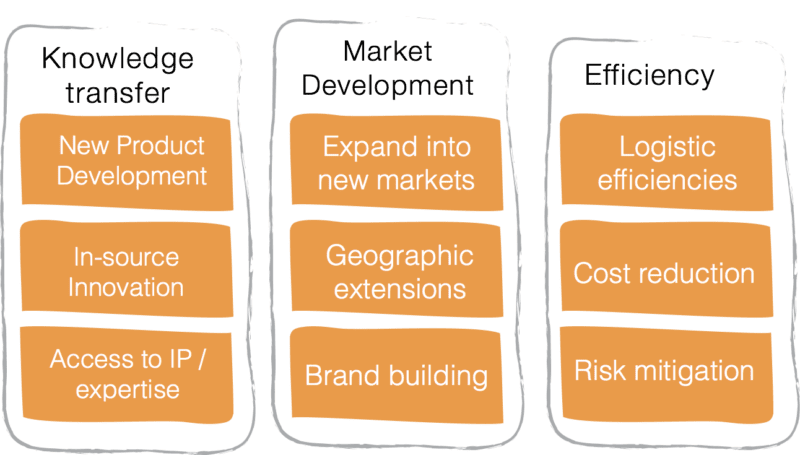In the previous article in this series we looked at what strategic alliances are. Why would you partner in strategic alliances?
In this article we will dive into the reasons companies can enter into strategic alliances. These reasons can be categorized into three main groups:
- Knowledge transfer:
 companies partner in strategic alliances because there is knowledge or IP required to create something new. An example here is the Senseo alliance between Philips and Sara Lee (Douwe Egberts). Each of the parties was lacking the knowledge the other had. Philips is good in creating household appliances and Sara Lee knows all about coffee. Together they were able to bring a balanced coffeemaker to the market with dedicated Senseo coffee supplies.
companies partner in strategic alliances because there is knowledge or IP required to create something new. An example here is the Senseo alliance between Philips and Sara Lee (Douwe Egberts). Each of the parties was lacking the knowledge the other had. Philips is good in creating household appliances and Sara Lee knows all about coffee. Together they were able to bring a balanced coffeemaker to the market with dedicated Senseo coffee supplies.
- Market development: here companies enter into alliances to be able to develop new markets, whether it be geographic extensions or new market segments. In 1994 Pepsi and Starbucks entered into an alliance to bring bottled cold coffee drinks to the market. For both of them a complete new market that was difficult for each of them to enter without the knowledge and capabilities of the other.
- Efficiency: alliances for efficiency reasons are alliances that have focus on cost reduction and increasing efficiencies. Take for instance the example of the Rolls Royce jet engine division. They established in 2003 an alliance with several international freight forwarders to increase the overall value to Rolls Royce’s customers. Coming from a traditional purchase relationship this partnership showed some unique elements. No longer was the focus on selecting the supplier with the lowest price, from now on the customer experience was the focus point. Partners were also encouraged to collaborate amongst each others, all with customer experience in mind. This partnership led to an increase to 99% on-time delivery and a 20% overall cost reduction without reducing partner profitability.
Alliances often start with one reason and move into the other areas during existence. Knowledge transfer may be the obvious reason to start an alliance. Then when you reach the point the product needs to be brought to the market, why not develop that market together too? And if you are working closely together then fine tuning for efficiency might make sense as well.
An alliance that spans several areas is the Novartis Malaria initiative. In 2001 Novartis established an alliance with the World Health Organization (WHO) to provide their Coartem medicine agains Malaria without profit for use by public health systems in developing countries. By 2011 over 400 million Coartem treatments had been delivered in more than 60 malaria-endemic countries, helping to save an estimated 1 million lives, mostly infants and children. On one hand this alliance may be seen as a market development alliance, it gives Novartis access to developing countries and helps build the brands there. On the other hand it can be seen as a knowledge transfer alliance as it gives Novartis access to a huge learning ground allowing to improve the medicine based on the feedback received. From a third angle it can be seen as an efficiency alliance, providing without profit is certainly not a philanthropic effort. The huge amount of treatments delivered provides Novartis economies of scale that would not have easily be reached otherwise. These economies of scale will amongst others have their impact on Novartis buying power from their suppliers and may result in lower purchase pricing for supplies that may benefit other products too.
The examples used in this article may be examples from large corporations, they show many angles to answer growth questions. They are, on a smaller scale, equally applicable to smaller organizations. As long as you keep a focus on your core capabilities and ensure you contribute and benefit, then alliances can be an excellent way to grow any organization.
Read more about creating and managing partnerships and alliances in my ebook “Successful Partnerships & Strategic Alliances”.
[…] for instance elements of the Senseo alliance between Sara Lee and Philips and I mentioned the Novartis Malaria Initiative. When you start searching for alliances in Pharma or in IT you will be able to find many large […]
[…] have seen what strategic alliances are and why one would partner in strategic alliances. Let’s in this article have a look at the alliance […]